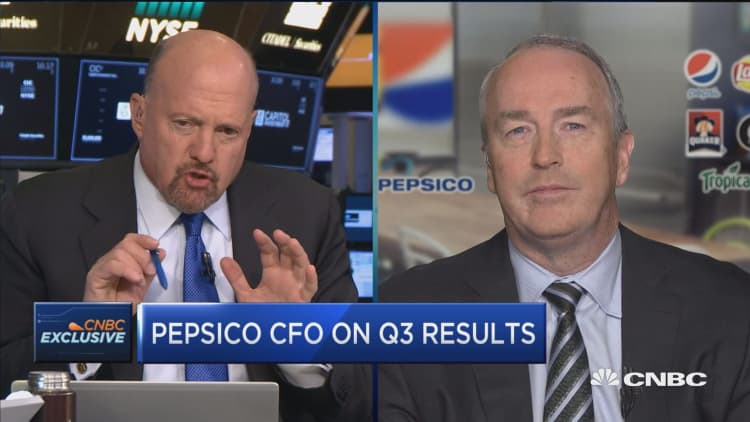
PepsiCo reported weaker-than-expected North American beverage sales, as the beverage giant struggled to toe the line between defending its core brands against spending to promote its newer ones.
Pepsi also blamed declining store traffic and a colder summer decreasing demand for its historically strong performing Gatorade drinks
"This summer, we directed too much of our media spending and shelf space to new low-calorie much smaller brands at the expense of our Pepsi and Mountain Dew trademarks," said CEO Indra Nooyi.
Ultimately, cost cutting and productivity improvements allowed the company to outpace Wall Street's earnings expectations, but revenue fell short. Pepsi is now on track to exceed full-year earnings targets, though it moderated expectations for full-year organic revenue growth.
Here's what Pepsi reported for the third quarter, compared with what Wall Street was expecting, based on a Thomson Reuters survey of analysts:
- Earnings of $1.48 a share, adjusted, beating expectations of $1.43 a share.
- Revenue was $16.24 billion versus an estimate of $16.31 billion.
The big lesson from the quarter, Nooyi said, "is that it's an endgame, not an all game. When we [launch] new products, we have to go for new shelf space. The core shelf space, especially in [convenience] stores for the big brands, we have to protect the hell out of it, and that's what we're going to do."
The North American beverage business generated revenue of $5.33 billion in the quarter, versus $5.52 billion the year-earlier period. Its operating profit dropped 10 percent, to $817 million from $904 million.
Pepsi, like all Big Food companies, has been under pressure to redevelop its portfolio to adjust to changing eating habits and compete against upstart brands like Bai. Pepsi has announced that by 2025, it expects at least two-thirds of its beverages to contain 100 calories or fewer per 12-ounce serving.
Some of its newer products include premium bottled-water brand, LIFEWTR, and a sparkling lemonade called Lemon Lemon, finance chief Hugh Johnston said in an interview Wednesday.
Still, most of the company's beverage sales continue to come from its core business, so the balance between growth and defending its position can be delicate.
In addition to new brands, Pepsi will continue to focus on low-calorie and zero-calorie offerings under the hood of its legacy brands, Nooyi said in the earnings call.
"We believe Pepsi's results should still be viewed as disappointing and emblematic of the broader issues facing its portfolio and the stock," said Jefferies analyst Kevin Grundy. He cited the increasingly challenging U.S. retail landscape, need for reinvestment and rapidly contracting trading multiples.
Pepsi shares have whipsawed in trading Wednesday, sinking as low as $106.19, before regaining ground to inch into slightly positive territory.
Outside of its North American beverage business, Pepsi performed largely well.
Declining convenience store retail traffic did not demonstrably hurt Pepsi's snack business, an area of the grocery store that continues to be popular with consumers. Net revenue at Frito-Lay, which also includes Smartfood popcorn and Doritos chips, grew 3 percent, while Quaker Foods, which includes Quaker rice crisps and Quaker Life cereal, grew 1 percent.
The soda and snack giant continues to see growth internationally, where it generates roughly 40 percent of its sales. It reported 5 percent growth in organic revenue in Latin America, 6 percent growth in Europe and sub-Saharan Africa and 9 percent in Asia, Middle East and North Africa. Organic revenue excludes the impacts of foreign exchange translation and structural changes.
All in all, third-quarter net income rose to $2.14 billion, or $1.49 per share, from $1.99 billion, or $1.37 per share, a year earlier.
Excluding items, the company earned $1.48 per share, beating expectations of $1.43 per share, according to Thomson Reuters. It increased operating profit by 6 percent.
It upped its expected adjusted earnings per share growth from 8 percent to 9 percent, as exchange rate impact is likely to be less than expected. The company said it is eyeing core earnings per share of $5.23 in 2017, up from $4.85 in 2016.
The Purchase, New York-based company trimmed its full-year organic revenue growth target, expecting growth to be about 2.3 percent, its growth rate in the year-to-date period, from a prior estimate of at least 3 percent.
Revenue in the latest quarter was $16.24 billion versus an estimate of $16.31 billion. Organic revenue grew 1.7 percent.
Correction: Pepsi expects full-year organic revenue growth to approximate its year-to-date growth rate of 2.3 percent. An earlier version also misspelled analyst Kevin Grundy's last name.


